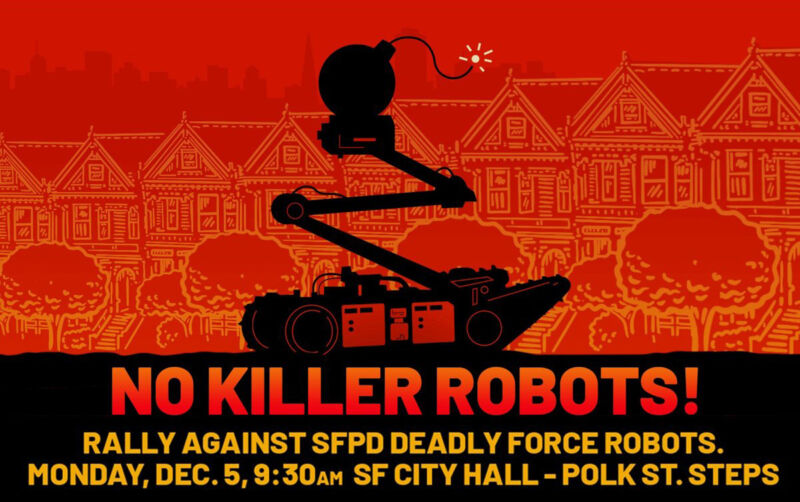
The robot police dystopia will have to wait. Last week the San Francisco Board of Supervisors voted to authorize the San Francisco Police Department to add lethal robots to its arsenal. The plan wasn't yet "robots with guns" (though some police bomb disposal robots fire shotgun shells already, and some are also used by the military as gun platforms) but to arm the bomb disposal robots with bombs, allowing them to drive up to suspects and detonate. Once the public got wind of this, the protests started, and after an 8–3 vote authorizing the robots last week, now the SF Board of Supervisors has unanimously voted to (at least temporarily) ban lethal robots.
Shortly after the initial news broke, a "No Killer Robots" campaign started with the involvement of the Electronic Frontier Foundation, the ACLU, and other civil rights groups. Forty-four community groups signed a letter in opposition to the policy, saying, "There is no basis to believe that robots toting explosives might be an exception to police overuse of deadly force. Using robots that are designed to disarm bombs to instead deliver them is a perfect example of this pattern of escalation, and of the militarization of the police force that concerns so many across the city.”
On December 5, over 100 protesters showed up to SF City Hall, carrying signs with phrases like, "We've all seen that movie... No Killer Robots."Among the protesters was Dean Preston, one of the SF supervisors who originally voted against the policy. Preston claims that the SFPD may have violated the law by not publicly publishing the robot policy 30 days before it goes up for a vote. In a letter to San Francisco Mayor London Breed and Police Chief William Scott, Preston cites California Gov Code 7071(b), which requires departments seeking approval for military equipment to "make those documents available on the law enforcement agency's Internet website at least 30 days prior to any public hearing concerning the military equipment at issue." Preston later adds: "I want to emphasize that this is not just a technicality. A primary purpose of [this law], written by our City Attorney when he was in the Assembly, is to ensure transparency and give the public an opportunity to weigh in on these policies."
As the San Francisco Chronicle reports, the use of lethal robots has been banned "for now." The issue will go back to committee for further discussion, and it could vote on the policy again in the future.
In a press release after the reversal, Preston says: “The people of San Francisco have spoken loud and clear: There is no place for killer police robots in our city.”
The statement ends with: "I am calling on my colleagues to take heed of the powerful backlash and make sure this harmful policy is never approved—not today, not tomorrow, not ever."
reader comments
170